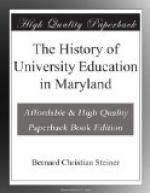I take my stand on the broad moral ground that every human being, from the highest to the lowest, has two sides to his life—his work and his leisure. To be without work in life is selfishness and sloth. But if a man or woman is so entangled in routine duties as never to command leisure, we have a right to say to such persons that they are leading an immoral life. Such an individual has no claim to the title of a working man, he is a slave. It may be cruel circumstances that have thus absorbed him in business, but that does not alter the fact: slavery was a misfortune rather than a fault to those who suffered it, but in any case to be content with slavery is a crime. Once get society to recognize the duty of leisure, and there is immediately a scope for such institutions as University Extension that exist for the purpose of giving intellectual interests for such leisure time. The movement is thus one of the greatest movements for the ‘raising of the masses.’ With a large section of the people there is, at the present moment, no conception of ‘rising’ in life, except that of rising out of one social rank into another. This last is of course a perfectly legitimate ambition, but it is outside the present discussion: University Extension knows nothing of social distinctions. It has to do with a far more important mode of ‘rising’ in life,—that of rising in the rank to which a man happens to belong at the moment, whether it be the rank in which he started or any other. There is a saying that all men are equal after dinner: and it is true that, while in the material wealth we seek in our working hours equality is a chimera, yet in the intellectual pursuits that belong to leisure there is no bar to the equality of all, except the difference of individual capacity and desire. Macaulay tells of the Dutch farmers who worked in the fields all day, and at night read the Georgics in the original. Scotch and




